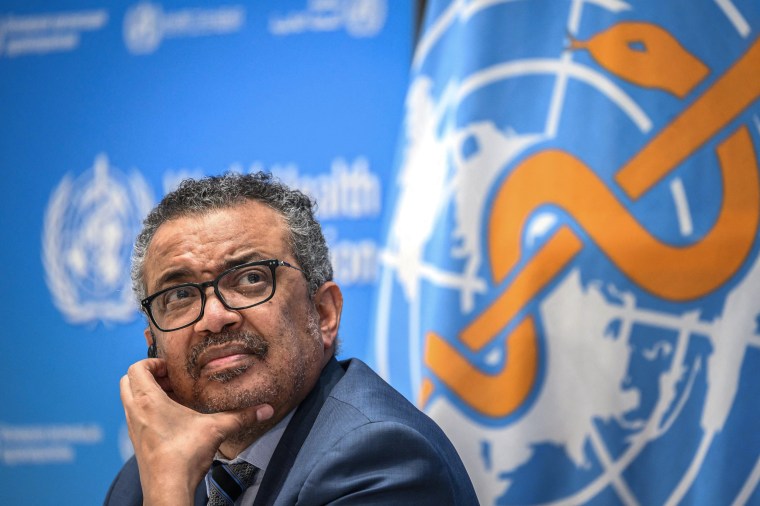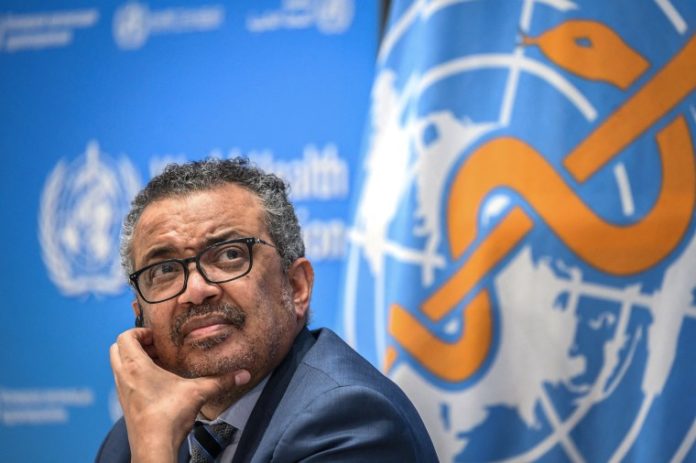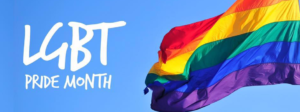The World Health Organization announced Saturday that the global monkeypox outbreak does not constitute a public health emergency of international concern for the time being.
WHO convened an emergency committee on Thursday to discuss whether the designation, which has been given to just six disease outbreaks since 2007, was appropriate for monkeypox.
“The emergency committee shared serious concerns about the scale and speed of the current outbreak,” WHO Director-General Tedros Adhanom Ghebreyesus said in a statement.
“Overall, in the report, they advised me that at this moment the event does not constitute a public health emergency of international concern, which is the highest level of alert WHO can issue,” he added.
WHO said in another statement that the Director-General agreed with the committee’s advice, though a few members of the committee “expressed differing views.”
WHO reserves this kind of emergency alert for “serious, sudden, unusual or unexpected” events that constitute a health risk to more than one country and may require an immediate, coordinated international response. The organization previously gave the designation to Covid-19, as well as Ebola, Zika, H1N1 flu and polio.
More than 4,000 monkeypox cases have been reported globally across 47 countries and territories since the start of May, according to the Centers for Disease Control and Prevention. The U.S. alone had recorded more than 200 cases across 25 states and Washington, D.C. as of Friday.
Previously, monkeypox was largely confined to Africa, where it is endemic in 11 countries. Most monkeypox infections have been recorded in the Democratic Republic of Congo, which saw more than 1,200 cases from January to May, according to WHO.
The version of the virus spreading internationally, the West African strain, has a fatality rate of 1%. No deaths outside of Africa have been reported in connection to the current outbreak. The other, the Congo Basin strain, has a fatality rate of 10%.

“The committee noted that many aspects of the current multi-country outbreak are unusual, such as the occurrence of cases in countries where monkeypox virus circulation had not been previously documented, and the fact that the vast majority of cases is observed among men who have sex with men, of young age,” WHO said on Saturday.
Some committee members said there was a risk of “further, sustained transmission into the wider population,” WHO added, given low levels of population immunity.
Tedros said the committee might reconvene “in the coming days and weeks” depending on how the outbreak evolves. The committee recommended taking a look at the outbreak again in a few weeks to observe any major changes, such as significant increases in the number of cases or evidence of more severe or transmissible disease.
What monkeypox symptoms look like
The name monkeypox is misleading: Although the virus was first discovered in laboratory monkeys in Denmark in 1958, it is much more common in small rodents.
Earlier this month, an international group of scientists called for the virus to be renamed to avoid discriminatory associations. Tedros said last week that WHO was working with experts to change the name of the virus, its strains, and the disease it causes.
The organization also said that in the recent outbreak, many people are “presenting with atypical symptoms,” including a localized rash with as little as one lesion.
Traditionally, monkeypox patients have developed flu-like symptoms such as fever and body aches, followed by a widespread rash, including on the face, arms and hands. But some recent patients have reported tiny bumps that resemble a pimple or blister as the first or only symptom. Some patients develop flu-like symptoms later, while others do not.
Many recent cases have developed rashes around the genitals or anus, along with painful, swollen lymph nodes. CDC officials said last week that some U.S. patients have reported pain in or around the anus and rectum, rectal bleeding, inflammation of the rectum lining, or the feeling of needing a bowel movement even though the bowels are empty.
Monkeypox cases may resemble chickenpox, herpes or syphilis, so the CDC recommends that anyone who develops symptoms associated with those illnesses get checked for monkeypox.
The virus appears to be spreading primarily through sexual activity among men who have sex with men, but some cases have been reported in women. Anyone who has close physical contact with an infected person’s lesions or rashes, as well as through respiratory droplets and contaminated items like clothing or bedding, can be infected.
WHO said Saturday that the emergency committee was concerned about “the rights to privacy, non-discrimination, physical and mental health, of affected population groups, which would further impede response efforts.”
What vaccines and treatments are available?
Monkeypox and smallpox are both orthopoxviruses, so smallpox vaccines can be used to prevent monkeypox. One shot in particular, called Jynneos, is specifically approved for use against monkeypox in Canada and the U.S., and has been approved for off-label use against the disease in Europe.
WHO does not recommend mass vaccination for monkeypox right now. Instead, it advises countries to vaccinate close contacts of infected people, ideally within four days of exposure, which can prevent the onset of symptoms and disease. WHO also recommends vaccines for healthcare workers who have been exposed to monkeypox and laboratory staff who perform diagnostic tests for the virus.
New York City opened a clinic on Thursday to vaccinate people who may have recently been exposed to monkeypox, including all gay, bisexual or other men who have sex with men “who have had multiple or anonymous sex partners in the last 14 days.” U.K. health officials also said earlier this week that doctors there could consider vaccinating some gay or bisexual men who are at higher risk of exposure, including men with multiple partners or who participate in group sex.
“By expanding the vaccine offer to those at higher risk, we hope to break chains of transmission and help contain the outbreak,” Dr. Mary Ramsay, head of immunization at the U.K. Health Security Agency, said in a statement.
Doctors can also administer smallpox antivirals and supportive care to monkeypox patients. Symptoms usually resolve after two to four weeks, though the lesions can leave scars.
WHO advises infected people to isolate until scabs from any lesions “have fallen off and a fresh layer of skin has formed.” It also recommends using condoms “to reduce the potential transmission of monkeypox, for which the risk is as yet not known.”








